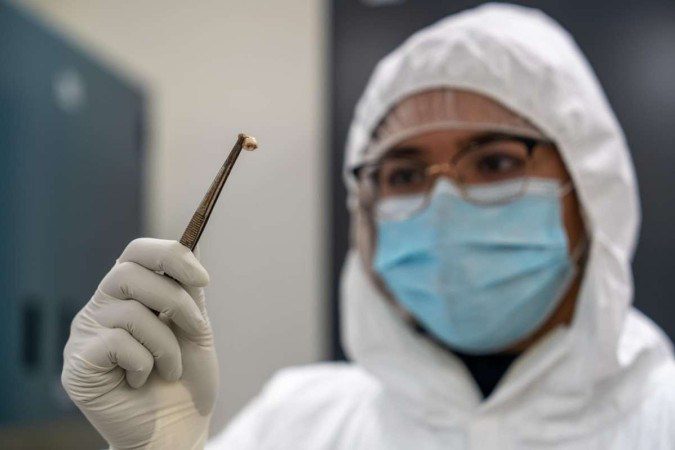Bacteria transmitted by flea bites modified the human genome
4 min read
Published 10/20/2022 06:00

(Credit: UChicago Medicine / Disclosure)
In the mid-14th century, a bacterium transmitted by flea bites wiped out 30% to 60% of the populations of North Africa, Europe and Asia. It was a quick event – from 1346 to 1350 – but due to its ability to destroy the human race, it affected genes related to the immune system. According to a study published in the journal Nature, the so-called bubonic plague has conferred resistance to the plague, which is still present in the world, with occasional outbreaks in the American continent, Russia and Asia. At the same time, the worst pandemic in history appears to have increased susceptibility to autoimmune diseases such as rheumatoid arthritis and Chron.
Caused by the bacteria Y. pestis and transmitted by infected fleas, plague first haunted the world 800 years ago, during the reign of Justinian. Within two centuries, as many as 100 million people were killed, helping to destabilize the mighty Roman Empire. While the bacteria are the same bacteria that caused the medieval deaths, the proportions of the microorganisms are different.
When the pathogen returned, after eight centuries of silence, it was as if the inhabitants of Eurasia and North Africa, who were now much more numerous, had never made contact with him before. Within four years, the demographic impact was so great that, according to the new study, the plague placed great selective pressure on humans, altering the frequency of genetic variants. By comparison, the devastating Covid-19 pandemic has killed just under 2% of the world’s population since the end of 2019.
leadership
“To my knowledge, our work is the first to demonstrate that the plague was in fact an important selective pressure for the evolution of the human immune system,” says Luis Barreiro, professor of genetics at the University of Chicago. He co-authored the study. “This has been speculated for a long time, but it is difficult to show by studying modern populations, because from that time until now, humans have faced many other pressures,” he says.
To solve this problem, the researchers used the most advanced sequencing techniques, which make it possible to accurately investigate ancient DNA. The scientists used bone samples collected from more than 200 people who lived in London, England, and Danish cities, and who died before, during, and after the plague passed through these regions in the late 1340s. Studying a group of 300 genes linked with the immune system, identifying four, Depending on the variant, susceptibility to protection or increased susceptibility to bacteria.
One of them proved to be particularly effective in resisting Y.pestis. This is ERAP2. People with two copies of a variant called rs2549794 produced more efficient genes than one that couldn’t translate instructions for making a protein either. According to Barreiro, a functional ERAP2 helps the immune system detect infection. “When the macrophage (a defense cell) finds a bacterium, it cuts it into pieces to present it to other cells of the immune system, which indicates an infection,” he says. “Having a working copy of the gene appears to create an advantage, potentially increasing the organism’s ability to detect the invading pathogen. We estimate that having two copies of the rs2549794 variant would make a person about 40% more likely to survive the plague. For those who have two copies of a non-functional alternative.”
In cells grown in the lab, the researchers tested and confirmed that rs2549794 helps the cells fight bacteria, while the non-functional variant is much less efficient at neutralizing the microorganisms. said Javier Pizarro-Cerda, director of the WHO Collaborative Center for Plague at the Pasteur Institute in France. “The results support ancient DNA evidence that rs2549794 protects against plague.”
Heredity has negative sides

Credit: Matt Clark/McMaster University/Disclosure
Says lead author of an article in Nature, Hendrik Poinar, director of the Center for Ancient DNA at McMaster University in Canada. “Even a small feature means the difference between survival or death. Of course, survivors of reproductive age will pass this information on in their genes.”
However, although selection of rs2549794 has integrated this variant into the human genome, protecting against plague, there are also negative consequences. According to the study, in modern populations, ERAP2 gene release is also associated with the occurrence of autoimmune diseases. It’s even a known risk factor for Crohn’s disease, a syndrome that affects the digestive system and can be fatal.
“Diseases and epidemics like the plague leave traces on our genomes, they are like archaeological clues,” Poinar said. “These genes undergo balanced selection – what provided tremendous protection during hundreds of years of plague epidemics now turns out to have autoimmune consequences. An overactive immune system may have been great in the past, but in today’s environment it may not be as useful.” .
According to Hendrik Poinar, future research with the same sample will study the entire genome, not just the selected set of genes. Scientists aim to discover variants that affect the susceptibility of bacteria in modern humans and compare them to ancient DNA.
difficult analysis
Until the advent of regular population vaccination in the last century, humans had little control over pathogens. Although the study provides evidence for rapid selection of immune defense variants, there are caveats to consider. Sequencing of historical samples is challenging, so it was necessary to limit the study to notable immune system genes involved in the response to many other pathogens. One possible avenue for future research would be to sequence the entire genome, to demonstrate that the burst of natural selection was, in fact, specific to Y.pestis. The results of this study suggest that ancient epidemiology is an aspect that must be considered in studies of the modern immune system.
David Enardis is a researcher in the Department of Evolutionary Biology at the University of Arizona, Tucson

“Entrepreneur. Music enthusiast. Lifelong communicator. General coffee aficionado. Internet scholar.”

:strip_icc()/s04.video.glbimg.com/x720/11792055.jpg)

:strip_icc()/s03.video.glbimg.com/x720/11786998.jpg)



